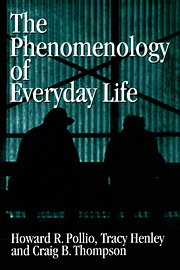Book contents
- Frontmatter
- Contents
- Preface
- PART I EXISTENTIAL PHENOMENOLOGY AND THE SCIENCE OF PSYCHOLOGY
- PART II GROUNDING THE WORLD OF EVERYDAY LIFE
- PART III SELECTED TOPICS FROM EVERYDAY LIFE
- 6 Feeling Alone
- 7 Making Amends: The Psychology of Reparation
- 8 Love and Loving
- 9 Falling Apart
- 10 The Meanings of Death in the Context of Life
- PART IV THE PHENOMENOLOGY OF EVERYDAY LIFE
- References
- Name Index
- Subject Index
10 - The Meanings of Death in the Context of Life
Published online by Cambridge University Press: 04 August 2010
- Frontmatter
- Contents
- Preface
- PART I EXISTENTIAL PHENOMENOLOGY AND THE SCIENCE OF PSYCHOLOGY
- PART II GROUNDING THE WORLD OF EVERYDAY LIFE
- PART III SELECTED TOPICS FROM EVERYDAY LIFE
- 6 Feeling Alone
- 7 Making Amends: The Psychology of Reparation
- 8 Love and Loving
- 9 Falling Apart
- 10 The Meanings of Death in the Context of Life
- PART IV THE PHENOMENOLOGY OF EVERYDAY LIFE
- References
- Name Index
- Subject Index
Summary
Death is a phenomenon that touches each human life. As human beings, we are faced at every moment with the possibility of our own death and with the death of those we love. The experience of life always serves as background to the meanings of death just as the meanings of death always serve as a background to those of life. This is the case whether death is experienced as a phenomenon that is meaningless, meaningful, or absent of meaning. According to Heidegger (1927/1962), human being-in-the-world is always a being-toward-death, and, insofar as this is the case, my experience of life is a testament to how I comport myself toward death. Perhaps it was for these reasons, not yet so clearly perceived, that Socrates sometimes described philosophy as “the study of death.”
Every comprehensive religious and philosophical system must address the problem of how death is to be understood within the context of life. Both Hinduism and Buddhism contend that there is no personal self; therefore, there can be no personal death. Hinduism is based upon Being, or that which is changeless and eternal and, therefore, not subject to death. Buddhism is based upon a process of Becoming, which involves continual change thereby eliminating personal identity and the significance of personal death.
In the Judaic tradition, God's covenant with Israel promised a continuity of the Jewish nation, and individual death was always related to the larger context of the Jewish people. Individual death within the Christian tradition also involved a transformation.
- Type
- Chapter
- Information
- The Phenomenology of Everyday LifeEmpirical Investigations of Human Experience, pp. 298 - 334Publisher: Cambridge University PressPrint publication year: 1997



